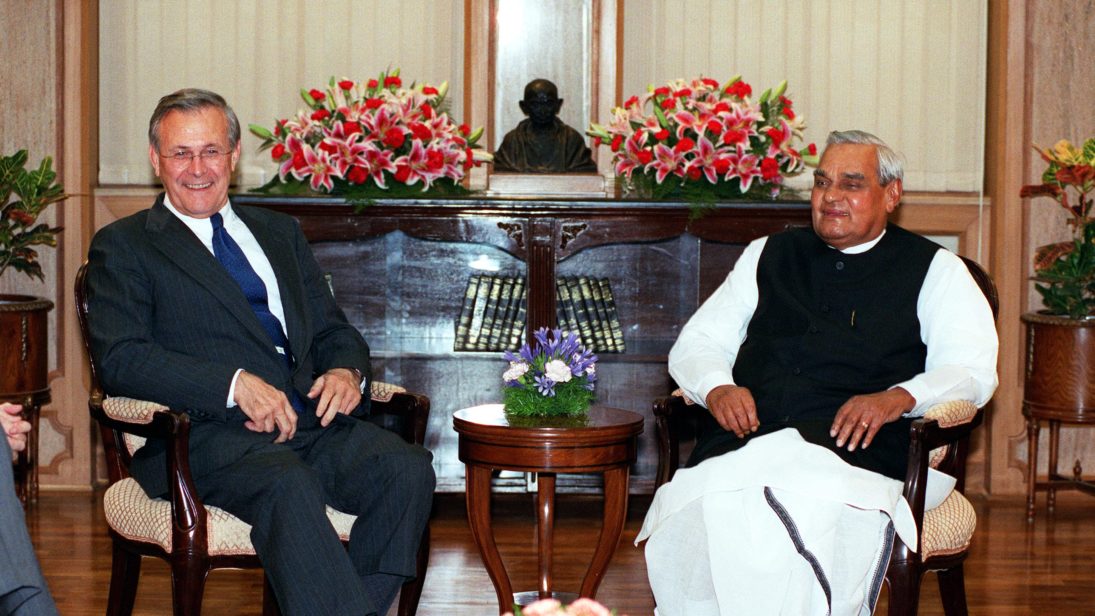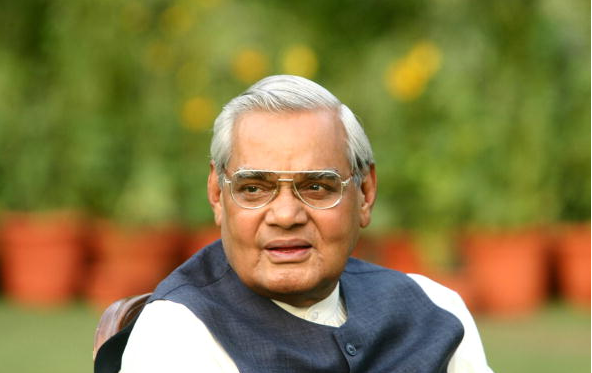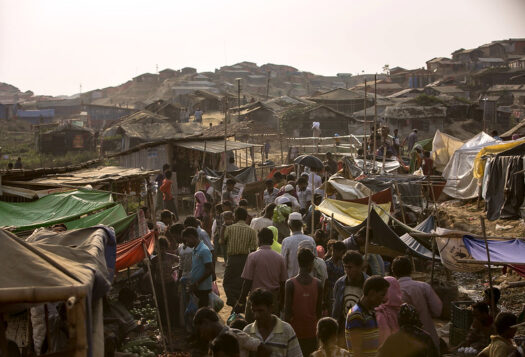
Atal Bihari Vajpayee (1924-2018), former Prime Minister of India and the first non-Congress leader to complete a full five-year term, passed away on August 16th. Vajpayee is credited for initiating a new beginning in India’s foreign and security policy during his six-year stint in office from 1998 to 2004, having navigated India through a host of domestic and external challenges from the moment he took office. Post-1991, after the fall of the Soviet Union, India initiated economic reforms and adjusted its foreign policy to the changing realities of international politics. His lifelong interest in foreign affairs, his brief stint as India’s Minister of External Affairs from 1977 to 1979, and his longstanding political experience helped him in taking these transformative steps. In his six years, Vajpayee attempted to break out of recycled thinking that had come to characterize India’s foreign and security policy.
Four pillars of Vajpayee’s foreign policy legacy are the strengthening and institutionalizing of India’s national security decisionmaking after crossing the overt nuclear weapons threshold in 1998; the pursuit of dialogue with Pakistan and Kashmiri leadership; movement towards the resolution of disputes with China; and the restructuring of ties between India and the United States. As India pays tribute to one of its tallest leaders and a liberal nationalist at heart, Vajpayee’s attempts to reset India’s foreign policy priorities can provide important lessons for the Modi government’s approach to foreign and security policy.
Institutionalizing National Security Decisionmaking
Vajpayee demonstrated how to handle the larger responsibilities brought on by India’s possession of nuclear weapons. Under his stewardship, in 1998, India surprised the world by testing its nuclear weapons, ending the ambiguity surrounding its nuclear program. Despite fighting the Kargil War in 1999 against Pakistan, Vajpayee never lost sight of the imperative of possessing nuclear weapons responsibly. Within a year of its nuclear tests, the Vajpayee government announced India’s draft nuclear doctrine, and subsequently created new institutions for managing security challenges for a nuclear-armed India, such as the National Security Advisory Board. The current Indian government’s lack of enthusiasm for further institutionalizing and strengthening national security decisionmaking stands in stark contrast to Vajpayee’s approach.
Pursuing Dialogue with Pakistan
Second, Vajpayee believed that a state can choose its friends, but not its neighbors. Thus, the only option for India and Pakistan to resolve outstanding problems was through dialogue. Therefore, in spite of facing challenges to bilateral ties like the 1999 Kargil War and the 2001 terrorist attack on the Indian parliament, Vajpayee persisted in making peace with Pakistan. He also initiated dialogue with Kashmiri separatist leadership in an effort to find a lasting solution to the Kashmir issue. Despite the Kargil conflict in 1999, Vajpayee visited Pakistan twice—Lahore in 1999 and Islamabad in 2004—and invited General Pervez Musharraf to Agra for talks in 2001. Vajpayee’s visit to Pakistan for the South Asian Association for Regional Cooperation summit in 2004 paved the way for a more positive phase of India-Pakistan ties marked by progress on regional cooperation and backchannel talks.
India’s current leadership could take a leaf out of Vajpayee’s playbook for dealing with Pakistan and Kashmir…Dialogue between India and Pakistan and Kashmiri leadership remains the only way to resolve the Kashmir issue.
The significance of Vajpayee’s efforts is underlined by the fact that his successor, Prime Minister Manmohan Singh, continued with these initiatives and built on them. In the current phase of instability in Kashmir and strained India-Pakistan relations, each of these initiatives now holds even more significance. Indeed, India’s current leadership could take a leaf out of Vajpayee’s playbook for dealing with Pakistan and Kashmir. Notwithstanding the current government’s tense relationship with Islamabad and the restive state of the Kashmir valley since 2016, dialogue between India and Pakistan and Kashmiri leadership remains the only way to resolve the Kashmir issue. In any effort to replicate the legacy of Vajpayee’s relations with Pakistan, Prime Minister Modi could initiate talks with Pakistan’s new leadership to improve relations—something that Pakistan’s new Prime Minister Imran Khan has also called for.

Resolving Disputes with China
Third, Vajpayee recognized the importance of a rising China in southern Asia, and therefore made efforts to resolve India-China boundary disputes and strengthen overall relations. During Vajpayee’s landmark visit to China in 2003, India and China signed a “Declaration on Principles for Relations and Comprehensive Cooperation” and decided to appoint Special Representatives (SR) to resolve the two countries’ boundary disputes. These SR talks have continued, with twenty rounds of talks held so far. Vajpayee’s visit to China and his signing of these agreements paved way for India and China to agree on another major agreement in 2005 outlining guiding principles for resolving their boundary disputes.
While new developments…indicate that India-China ties are on the upswing, the Modi government’s on-again, off-again stance towards Beijing does not bode well for the long-term resolution of disputes between India and China.
Vajpayee’s move to settle India’s border disputes with China was a hallmark of his China policy. In this context, the present state of India’s China policy could be reassessed. Under the Modi government, India’s China policy since 2014 has alternated between overt displays of friendship and muscular positioning. Last year’s Doklam crisis marked the lowest point in India-China relations in the recent past. While recent developments, such as the visit of China’s defense minister to India this week, indicate that India-China ties are on the upswing, the Modi government’s on-again, off-again stance towards Beijing does not bode well for the long-term resolution of disputes between India and China.
Rebuilding the India-U.S. Relationship
Fourth, and most importantly, Vajpayee understood the importance of rebuilding the India-U.S. relationship, and was instrumental in resetting India’s approach towards the United States after the 1998 nuclear tests strained ties between the two countries. He characterized the United States as India’s “natural ally,” and launched the Next Steps in Strategic Partnership in 2004. Increased cooperation in the commerce, defense, and technology spheres during Vajpayee’s tenure laid foundations for further unlocking the potential of bilateral cooperation between India and the United States. The 2005 India-U.S. civilian nuclear deal was an outcome of this process of resetting ties. If Vajpayee could advance India-U.S. relations despite initial differences with the United States over the nuclear tests, India’s current leadership could surely find a way to resolve the United States’ discomfort with India’s close ties to Russia and Iran.
Today, as a more ambitious and powerful India seeks to reshape its regional strategic environment, it should revisit these four lessons from the Vajpayee years.
***
Image 1: U.S. Department of Defense
Image 2: Hemant Chawla, the India Today Group via Getty Images


